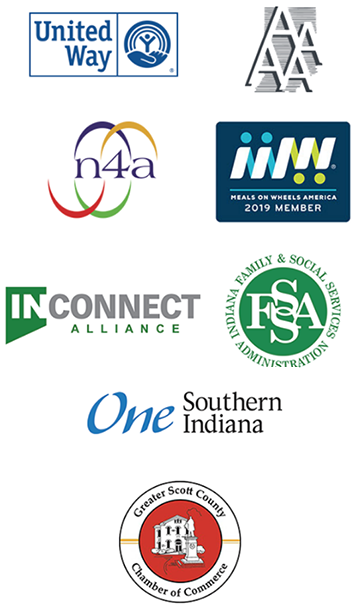Case Management services provided by LifeSpan Resources are contracted by the State of Indiana’s Division of Aging under the Family Social Services Administration for clients using Home and Community Based Services (HCBS) under the Aged & Disabled Medicaid Waiver (A&D), Traumatic Brain Injury Waiver (TBI), CHOICE (Community and Home Options to Institutional Care for the Elderly and Disabled), and SSBG (Social Service Block Grant)/Title III funding. The definition of case management, eligibility for case management and other services available through the various programs, as well as any other guidelines that are to be followed by LifeSpan Resources, are all stipulated by LifeSpan Resources’ contract with the Division of Aging and the state of Indiana.
Through Case Management services LifeSpan Resources is able to link residents in the counties of Clark, Floyd, Harrison, and Scott to in-home services. These are services that allow a person to remain in their home. The services are available following an assessment to determine program eligibility and need.
LifeSpan Resources serves as the single point of entry for a variety of supportive programs for frail older persons and individuals of any age with disabilities. We offer case management to participants who are eligible for the programs below. Case Managers help participants obtain the supports needed to live as independently as possible in their community by coordinating and integrating needed services through a person centered service plan. LifeSpan Resources’ case managers are certified by the Indiana Division of Aging and are professionals who hold a variety of degrees in human services related fields including social work, psychology, sociology and nursing.
- C.H.O.I.C.E. – The Community and Home Options to Institutional Care for the Elderly and Disabled program is designed to provide a wide variety of in-home services as an alternative to unnecessary or premature placement in a long term care facility. C.H.O.I.C.E. is the funding of last resort, as such; all other funding sources must be used first.
- Older Americans Act – Funds are targeted to low income, frail, and isolated older persons.
- National Family Caregiver Program – Serves the primary caregiver who is caring for someone who is age 60 or older or people of any age living with dementia.
Adult Day Services: Community-based group programs designed to meet the needs of adults with impairments through individual service plans.
Attendant Care: Attendant care services primarily involve hands-on assistance for aging adults and persons with disabilities.
Case Management: Case managers coordinate and integrate all services required in a participant’s person centered plan, link participants to needed services, and ensure that participants continue to receive and benefit from services. Case managers enable participants to receive a full range of services needed due to a medical condition in a planned, coordinated, efficient and effective manner.
Environmental Modifications: Environmental modifications are minor physical adaptations to the home that are necessary to ensure the health, welfare, and safety of the individual.
Home-Delivered Meals: A home-delivered meal is a nutritionally balanced meal. “Meals To Go”; Diabetic Meals, Soft Foods, Puree and breakfast boxes prepared by a caterer. Homebound meals are delivered weekly and include 7 complete meals.
Homemaker Services: Homemaker services offer direct and practical assistance consisting of household tasks and related activities.
Nutritional Supplements: Nutritional (dietary) supplements include liquid supplements, such as Boost or Ensure, to maintain an individual’s health in order to remain in the community.
Personal Emergency Response System: An electronic device that enables the person to secure help in case of any emergency.
Pest Control: Services that are designed to prevent, suppress, or eradicate anything that competes with humans for food and water, injures humans, spreads disease to humans, or annoys humans, and is causing or is expected to cause more harm that is reasonable to accept.
Respite Services: Periodic, short-term care to a person when the family member or the primary caregiver cannot be there or needs a rest from his/her care responsibilities. Does not include “child care” to enable caregiver to work or attend school.
Specialized Medical Equipment and Supplies: Specialized medical equipment and supplies are medically prescribed items required by the individual’s service plan, which are necessary to assure the health, welfare and safety of the individual.
Transportation: Services offered to enable individuals to gain access to medical appointments and other community services, activities, and resources.






